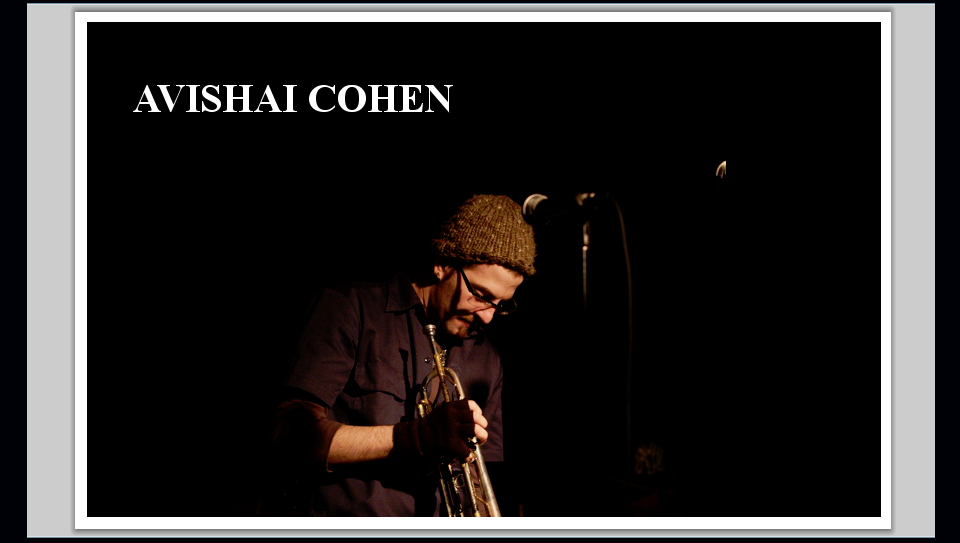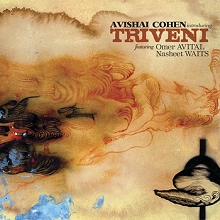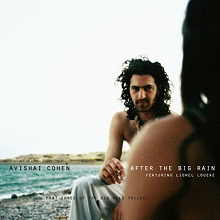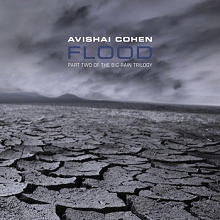Trumpeter Avishai Cohen with The Collective
The Avishai Cohen peformed with The Collective concert as a part of the 2014 Reno Jazz Festival, Thursday, April 10, 2014 7:30 p.m. at Nightingale Concert Hall. The concert was included in the Jazz Fan, Full Festival and Thursday passes.
The following is from Avishai Cohen's Web site and/or press kit.
Visit the official Web site here.
Avishai Cohen
Trumpeter Avishai Cohen – voted a Rising Star in the 2012 DownBeat Critics Poll – has earned renown as a musician with an individual sound and a questing spirit, an ever-creative player-composer open to multiple strains of jazz and active internationally as a leader, co-leader and sideman. The New York Times described him as “an assertive, accomplished trumpeter with a taste for modernism.” Avishai played a headlining set at the 2011 Newport Jazz Festival, leading his bold, thrilling trio Triveni with double-bassist Omer Avital and drummer Nasheet Waits. Anzic Records will release the trio’s second album, Triveni II – Avishai’s sixth recording as a leader – in October 2012. The trumpeter also records and tours the world as part of the prestigious SF Jazz Collective, as he does with The 3 Cohens Sextet – the hit family band with his sister, clarinetist-saxophonist Anat, and brother, saxophonist Yuval. With The 3 Cohens, Avishai has twice headlined the hallowed Village Vanguard, as well as appeared on the cover of the January 2012 issue of DownBeat. He is also co-leader of Third World Love, a longstanding multicultural venture with bassist Omer Avital, pianist Yonatan Avishai and drummer Daniel Freedman.
Reviewing Triveni live at the Jazz Standard, The New York Times praised Avishai as “an extravagantly skilled trumpeter, relaxed and soulful. . . deftly combining sensitivity and flair.” The trio’s debut album, Introducing Triveni, set Avishai’s originals alongside standards, including classics by Duke Ellington and John Coltrane. New York City Jazz Record called the album “easily one of the best jazz recordings of 2010,” and DownBeat listed it in the magazine’s year-end top 10. Although Triveni is a vehicle for high-energy improvisation, Avishai says: “My approach to this trio has been to challenge ourselves to stay lyrical and true, to balance freedom with self-restraint. The discipline of that is an art itself.” Both Triveni albums were recorded in the same blockbuster two-day session in Brooklyn, with Triveni II featuring not only more exciting originals by Avishai but inspired interpretations of tunes by Dizzy Gillespie, Charles Mingus, Don Cherry and Ornette Coleman. One of the Coleman pieces had never been recorded before, with the iconic saxophonist teaching the tune directly to the trumpeter. With his clarion tone, harmonic sophistication, playful rhythmic sensibility and ability to play both inside and outside the tradition, Avishai has become a favorite of several veteran jazz stars. Italian trumpet sage Enrico Rava has called him “my favorite young trumpeter.”
Born and raised in Tel Aviv, Israel, Avishai began performing in public in 1988 at age 10, playing his first solos with a big band and eventually touring with the Young Israeli Philharmonic Orchestra to perform under the likes of maestros Zubin Mehta, Kurt Masur and Kent Nagano. Having worked with Israeli folk and pop artists in his native country and appeared on television early on, Avishai arrived as an experienced professional musician when he took up a full scholarship at Berklee College of Music in Boston. In 1997, the young musician established an international reputation by placing third in the Thelonious Monk Jazz Trumpet Competition. Avishai came of age as a jazz player as part of the fertile scene at Smalls, the storied club in New York’s West Village, where he developed his artistic vision alongside such friends and colleagues as pianist Jason Lindner and bassist Omer Avital. The trumpeter’s artistic stance was informed by the fresh, broad-minded legacy of this vital 21st-century scene. Avishai also toured and recorded with the avant-punk Lemon Juice Quartet, experimenting with effects and collaborating with friends, a common thread throughout his career; the band’s 2002 release Peasant Songs earned praise from the likes of DownBeat, which applauded the album’s “rollicking joi d’vivre.”
Growing up in Israel, Avishai says, “We didn’t really have any real-deal jazz musicians whom we could see in a club, or look up to. I learned jazz mostly from records. But this at least meant that I learned from the greatest: Louis Armstrong, Miles Davis, John Coltrane, Sonny Rollins, Thelonious Monk. Theirs was the language I learned to speak. Then saxophonist Arnie Lawrence came to Israel, and I started playing with him at age 14. He was the only real mentor I had there. But in Israel, there was something else that was important to my musical development: this rich sense of lyricism in older Israeli music. The radio would play certain songs for certain days, with a melancholy vibe on the memorial days. Most of that music was vocal, and you couldn’t help but soak up that fluid, singing feel. And, of course, Israel is a real crossroads of East and West, with the different melodic sensibilities of Eastern Europe and Sephardic culture mixing – and the rhythms of North Africa are right there, too. My music doesn’t sound Israeli, and I left at 18, but that broader sense of music is definitely in me.”
Avishai’s discography as a leader includes: The Trumpet Player (Fresh Sounds New Talent, 2002), After The Big Rain (Anzic, 2007), Flood (Anzic, 2008), Seven (Anzic, 2008), Introducing Triveni (Anzic, 2010) and Triveni II (Anzic, 2012). His debut, The Trumpet Player, saw him lead a session with bassist John Sullivan and drummer Jeff Ballard plus guest saxophonist Joel Frahm, mixing originals with interpretations of John Coltrane’s “Dear Lord” and Ornette Coleman’s “Giggin’.” A harbinger of his future chord-less trio projects, The Trumpet Player was lauded by the likes of The New York Times, whichsaid: “Cohen’s album is a thrown gauntlet. . . He’s got some of the confident tone and rhythm of Clifford Brown under his fingers, and plays battling, hard-hitting figures and intervals.”
Deeply influenced by West African grooves, Flood and After the Big Rain are part of an ongoing conceptual trilogy featuring all original compositions by Avishai. A spare and contemplative album, Flood set the trumpeter in an uncommon format with Yonatan Avishai on piano and Daniel Freedman on percussion. The more expansive, extrovert After the Big Rain featured guitarist-vocalist Lionel Loueke, keyboardist Jason Lindner, bassist Omer Avital, drummer Daniel Freedman and percussionist Yosvany Terry. Speaking to the wide purview of these two albums, JazzTimes declared: “Cohen is a multi-cultural jazz musician, among whose ancestors is Miles Davis. Like Davis, he can make the trumpet a vehicle for uttering the most poignant human cries.” And Hot House Jazz magazine said: “This music succeeds as a finely realized ambitious chamber project showcasing the virtuosity and stylistic range of a trumpeter who’s one of the most exciting voices on the horn to emerge in this new century.” The album Seven saw Avishai demonstrate another facet of his compositional talents. The digital-only release showcases an entrancing three-hour minimalist soundscape for trumpet, harp, cello, piano, bass clarinet and electric guitar written for a video installation at the Times Square Building by artist Elinor Milcham.
With Avishai performing alongside his two elder siblings, The 3 Cohens Sextet has enjoyed wide acclaim for the albums One (self-released, 2003), Braid (Anzic, 2007) and Family (Anzic, 2011). Declared All About Jazz: “To the ranks of the Heaths of Philadelphia, the Joneses of Detroit and the Marsalises of New Orleans, fans can now add the 3 Cohens of Tel Aviv.” The 3 Cohens band has toured from across the U.S. and Europe to Brazil and Australia. Avishai has contributed several fine original compositions to The 3 Cohens repertoire. One of the highlights of Braid is his melodically gorgeous “Gigi et Amelie,” while the recent Family album features Avishai's loving title showcase for the group's telepathic three-horn interweave and his Charles Mingus-inflected number “With the Soul of the Greatest of Them All.” About the experience of performing in a unit with his siblings, Avishai says: “The 3 Cohens is very close to my heart in that I’m creating music not only with incredible musicians but with people I know so well and love unconditionally. It’s a rare thing. And playing the Village Vanguard was such a milestone – this place I’d always dreamed of performing, where the walls reverberate with the sounds of Coltrane, Sonny, on and on. Playing there with my sister and brother is something I’ll be proud of forever.”
For Avishai and his partners in Third World Love, the band isn’t just about exploring a wider world of grooves – from the Middle East, Africa, Iberia and beyond – “it’s about a brotherhood, about evolving in music with kindred spirits,” says the trumpeter. Third World Love has produced five albums in 10 years, becoming a more cohesive unit with each release. The band’s most recent album is Songs & Portraits (Anzic, 2011), with its highlights including Avishai’s lyrical original “Song for a Dying Country.” Third World Love’s previous release, New Blues (Anzic, 2007), featured Avishai’s West African-accented “Nature’s Dance,” as well as the second appearance of his lovely ballad “Gigi et Amelie” – which “is fit to be a future standard,” declared All Music Guide.
Avishai has recorded two albums as a member of the SF Jazz Collective, tributes to Horace Silver and Stevie Wonder. About his work in collective groups, the trumpeter says: “I like the power and freedom of a collective, where the show isn’t run by one man or woman. I think it creates a different sort of bond with the audience, and with various people writing, there’s a lot of variety in the music, a lot of different challenges. And the democratic give-and-take can only help you grow.”
As a sideman, Avishai has recently toured in headlining bands led by Kenny Werner and Mark Turner. The trumpeter goes into the studio with Turner to record an ECM album this winter. Avishai plays regularly in the Mingus Big Band and Mingus Dynasty ensemble, and he has lent his trumpet to recordings by Anat Cohen, Yuval Cohen and Jason Lindner, along with collaborating on stage and in the studio with singer-songwriter Keren Ann. His playing has also appeared on such soundtracks as American Gangster and Soul Man. As a teacher, Avishai gives courses at Siena Jazz in Italy, along with holding masterclasses from Israel and Barcelona to Winnipeg and Berklee in Boston. Avishai was a chosen artist for the Israel Cultural Excellence Foundation (IcExcellence), from 2004 to 2010.
Through his diverse musical experiences and what he calls the satisfying “slow burn” of his career so far, Avishai has come to appreciate that “music isn’t a product – it’s a process,” he says. “Music takes time to develop organically, which is why I prefer to work with family and friends who are like family. I really like being in a place musically where nothing’s a given and there is always something new ahead.”
Photos, sound samples and more available at:
www.avishaicohenmusic.com












